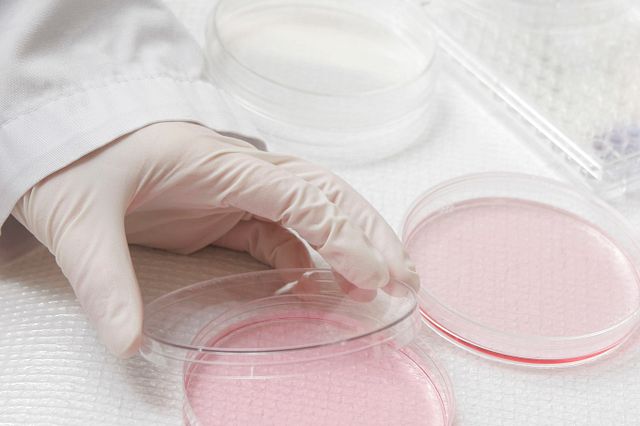ISO 11737 Microbiological Testing of Medical Devices
The ISO 11737 series is a set of standards that provide guidelines and procedures for microbiological testing of medical devices. These tests are crucial to ensure the biocompatibility and safety of implantable and non-implantable medical devices, including those used in additive manufacturing (AM) processes. Biocompatibility testing assesses whether a device can be safely placed within the human body without causing adverse biological reactions.
The standards cover various aspects of microbiological testing, such as the selection of test organisms, culture media, and incubation conditions. They also provide detailed protocols for specimen preparation, inoculation methods, and evaluation criteria. These guidelines are essential to ensure consistent and accurate results across different laboratories and jurisdictions.
Medical devices fabricated using AM techniques often require additional considerations due to the complexity of the materials used and the potential for contamination during the manufacturing process. ISO 11737 ensures that these devices undergo rigorous testing to meet stringent biocompatibility requirements, thereby enhancing patient safety and regulatory compliance.
The standards apply to a wide range of medical devices, including implants, prosthetics, and other items intended for prolonged use within or on the human body. Compliance with ISO 11737 is mandatory for manufacturers aiming to sell their products in countries adhering to these international guidelines.
Biocompatibility testing typically involves several steps, starting with the selection of appropriate test organisms based on the specific device type and intended use. The selected organisms are then inoculated onto the device surface under controlled conditions, followed by incubation and observation for signs of microbial growth or adverse reactions.
The results of these tests are carefully documented and analyzed to determine whether the device meets the specified biocompatibility criteria outlined in ISO 11737. This information is vital for manufacturers to ensure their products are safe and effective, ultimately contributing to improved patient outcomes and reduced risk of complications.
For additive manufacturing processes, the testing protocols may need to be adapted to account for the unique characteristics of the materials used and the potential for contamination during the printing process. By adhering to ISO 11737 standards, manufacturers can ensure that their AM-produced devices undergo thorough microbiological evaluation, thereby maintaining high levels of safety and quality.
Understanding the requirements and procedures outlined in ISO 11737 is crucial for quality managers, compliance officers, R&D engineers, and procurement teams involved in medical device manufacturing. Familiarity with these standards enables stakeholders to make informed decisions about testing protocols, specimen preparation, and instrumentation to achieve consistent and reliable results.
Applied Standards
| Standard | Description |
|---|---|
| ISO 11737-1 | Guidelines for the selection of test organisms and culture media. |
| ISO 11737-2 | Procedures for specimen preparation and inoculation methods. |
| ISO 11737-3 | Incubation conditions and evaluation criteria for microbiological testing. |
| ISO 11737-4 | Specific requirements for implantable devices, including AM-produced items. |
| ISO 11737-5 | Guidelines for non-implantable devices and their microbiological evaluation. |
| ISO 11737-6 | Additional considerations for medical devices used in high-risk applications. |
Competitive Advantage and Market Impact
Compliance with ISO 11737 standards provides manufacturers with a significant competitive advantage in the global market. By adhering to these international guidelines, companies can demonstrate their commitment to quality and safety, thereby gaining trust from regulatory bodies and healthcare providers.
The rigorous testing procedures outlined in ISO 11737 ensure that medical devices meet stringent biocompatibility requirements, which is essential for maintaining patient safety and satisfaction. This, in turn, enhances the reputation of compliant manufacturers and contributes to their long-term success in the industry.
Moreover, adherence to these standards can facilitate smoother interactions with regulatory authorities and accelerate the approval process for new medical devices. This streamlined approach can significantly reduce development time and costs, providing a clear competitive edge over non-compliant competitors.
In addition to enhancing market reputation and streamlining regulatory processes, compliance with ISO 11737 also promotes innovation within manufacturing processes. By adopting best practices in microbiological testing, companies can identify potential areas for improvement and implement advanced techniques, such as AM, to produce safer and more effective medical devices.
The demand for safe and reliable medical devices continues to grow, driven by increasing life expectancy and advancements in healthcare technology. Manufacturers who prioritize quality and safety through ISO 11737 compliance are well-positioned to meet these demands and capture a larger share of the market.
Use Cases and Application Examples
The application of ISO 11737 standards in microbiological testing is particularly relevant for medical devices fabricated using additive manufacturing techniques. These devices often require specialized testing to ensure that they meet biocompatibility requirements, especially given the complexity of the materials used and the potential for contamination during the printing process.
For example, a manufacturer producing titanium implants using AM may need to undergo rigorous microbiological testing to verify that the surface properties do not promote microbial growth or adverse reactions. Similarly, companies developing custom prosthetics through 3D printing must ensure that their products are free from contaminants and meet stringent biocompatibility criteria.
In another scenario, a research institution might use ISO 11737 standards to evaluate new materials for medical devices, such as biodegradable polymers or advanced ceramics. By applying these guidelines, the researchers can assess the material’s compatibility with human tissues and determine its suitability for various applications.
The standards also play a crucial role in ensuring that medical devices used in high-risk applications, such as cardiovascular interventions or orthopedic surgeries, meet biocompatibility requirements. These devices must undergo thorough testing to ensure they do not pose any risks to patients undergoing treatment.
In conclusion, ISO 11737 standards provide essential guidelines for microbiological testing of medical devices, ensuring that these products are safe and effective for use in various applications. By adhering to these international guidelines, manufacturers can gain a competitive advantage, enhance their reputation, and meet the growing demands of the global market.





